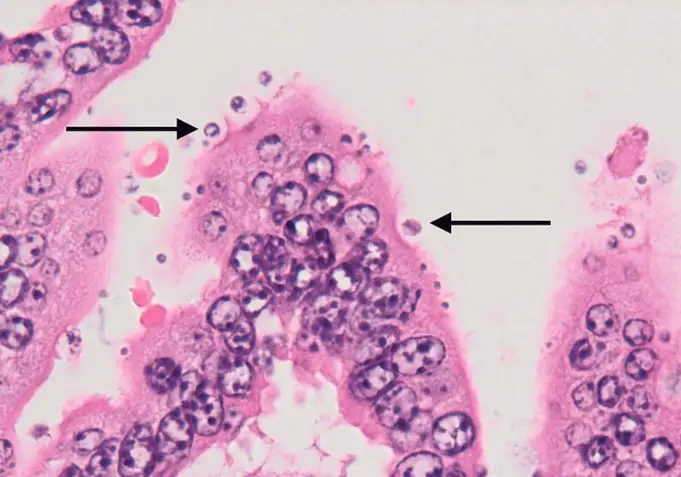Cryptosporidiosis is a condition caused by a parasite called Cryptosporidium. It affects the small intestine and causes diarrhoea in the patient.
It also affects the respiratory tract in individuals with a standard functioning immune system and to individuals whose immune system is compromised, it causes watery diarrhoea and cough and more severe symptoms.
It can affect all age groups, but some groups are more susceptible to developing severe complications. In patients with a compromised immune system, the Cryptosporidium parasite can infect other organs like the digestive tract areas, the respiratory tract, pancreas, the upper gastrointestinal tract and the urinary bladder.
Individuals with a compromised immune system include people with HIV/AIDS, cancer patients undergoing chemotherapy or people with inherited illnesses that affect the immune system.
There are many species of Cryptosporidium that infect animals as well as human. The parasite is protected by an outer layer which enables it to survive for more extended periods and make it tolerant to chlorine disinfection.
Causes
Cryptosporidiosis is one of the most common waterborne diseases and can be found worldwide despite not being discovered and identified until 1976. The infection occurs when a human consumes contaminated food or water, even though this may not be intentional.
The infection may occur without the infected individual showing or experiencing symptoms (i.e. asymptomatic infection), or the infection may be severe.
The Cryptosporidium parasite is usually sited in the intestine of an infected animal or human. When they are shed, they can be found in an infected person or animal’s stool. Shedding happens at the onset of the symptoms and can last weeks even after the symptoms stop.
The Cryptosporidium parasite can be found in contaminated soil, food, poorly treated water or hard surfaces. One can get infected mainly through swallowing the parasites usually by eating contaminated food, drinking contaminated water or engaging in sexual activities that exposes one to faeces.
Symptoms
Early symptoms of the infection usually are 2 to 10 days after infection occurs, and the symptoms include the following:
- Watery diarrhoea (mild to severe) that may contain mucus or blood
- Abdominal pain or cramps
- Nausea
- Dehydration
- Vomiting
- Weight loss
- Fever
- Fatigue
Symptoms usually last for about a few days to 4 weeks in a person with a healthy functioning immune system. However, there might be cases of recurrence of symptoms even after recovery.
This occasional reoccurrence can happen on and off for 30 days. Other rare symptoms include:
- Arthritis
- Jaundice
- Ascites
Respiratory symptoms include:
- Cough
- Shortness of breath
- Nasal discharge
- Voice hoarseness
- Swelling of the nasal mucosa, sinuses, larynx
Diagnosis
Diagnosis is made by examining stool samples. Patients may be asked to leave several stool samples over several days. This is because detection of the Cryptosporidium parasite can be difficult.
The stool samples are usually examined using the microscope.
Treatment
Cryptosporidiosis usually self resolves in individuals with a healthy immune system (even without treatment). Symptoms like diarrhoea can be managed by taking a lot of fluids. However, patients with compromised immune or underlying illness may have more severe symptoms and prolonged illness.
Children and pregnant women who have Cryptosporidiosis are more prone to dehydration due to the diarrhoea and should take a lot of fluid. Dehydration can be life-threatening to babies; therefore, it is advised to contact your health care provider for fluid replacement therapy.
There are anti-diarrheal drugs such as Nitazoxatide can help slow down the loose stool in individuals with a regular functioning immune system. Still, its effectiveness is unclear to immune-compromised patients.
Anti-retroviral therapy in patients with HIV/AIDS is effective in improving the symptoms. This is because the anti-retroviral therapy helps enhance the immune system. Cryptosporidiosis is not curable, but symptoms will improve (on its own or with treatment). Nonetheless, symptoms may return or worsen if the immune status declines.
Prevention
The following are recommendations to help prevent and curb the spread of Cryptosporidiosis for the members of the general public:
- Practise good hand hygiene by washing your hands with running water and soap. Alcohol-based hand drops are not effective against Cryptosporidiosis.
- At child care centres, separate children who are ill with diarrhoea from healthy ones until the diarrhoea stops
- Clean and disinfect hard surfaces and toys to prevent infections from spreading
- Make sure kids wash their hands regularly
- Do not swim or allow kids with diarrhoea swim. If diagnosed with Cryptosporidiosis, wait two weeks before going to swim
- Always change kid’s diapers in the bathroom or appropriate changing areas
- Do not drink untreated water from shallow wells, ponds or lake
- Avoid unpasteurised milk, apple cider or juice.
- Thoroughly have your vegetables and fruits washed before consumption
- Avoid uncooked or undercooked food in areas where food supply might be unsafe
- Avoid oral, vaginal or anal sex until two weeks after the diarrheal symptoms have stopped
- Wash genitals and anus with clean water and soap after sexual activities.
- Practise safer sex. Use condoms during sex. Use latex gloves during anal fingering.
- Wash your hands after handling used condoms and sex toys.
- Cryptosporidium is known to be resistant to chlorine disinfection, but with enough concentration and contact time, it can be deactivated with Chlorine oxide and ozone treatment. This is a known and effective way to control Cryptosporidium parasite in water. Ultraviolet light treatment is also effective ways to inactivate Cryptosporidium.
- Boiling water before drinking it is the most reliable way to prevent Cryptosporidiosis
- In the United States of America, the law requires health care workers to report cases of Cryptosporidiosis to local and state health department. They work and report to the Centre for Disease Control and Prevention.
References;
- Parasites – Cryptosporidium (also known as “Crypto”)- CDC












